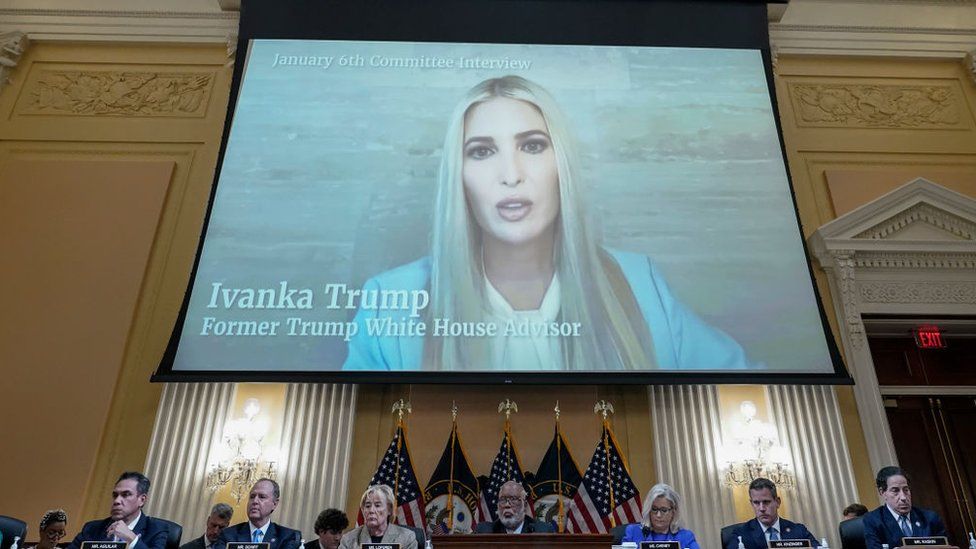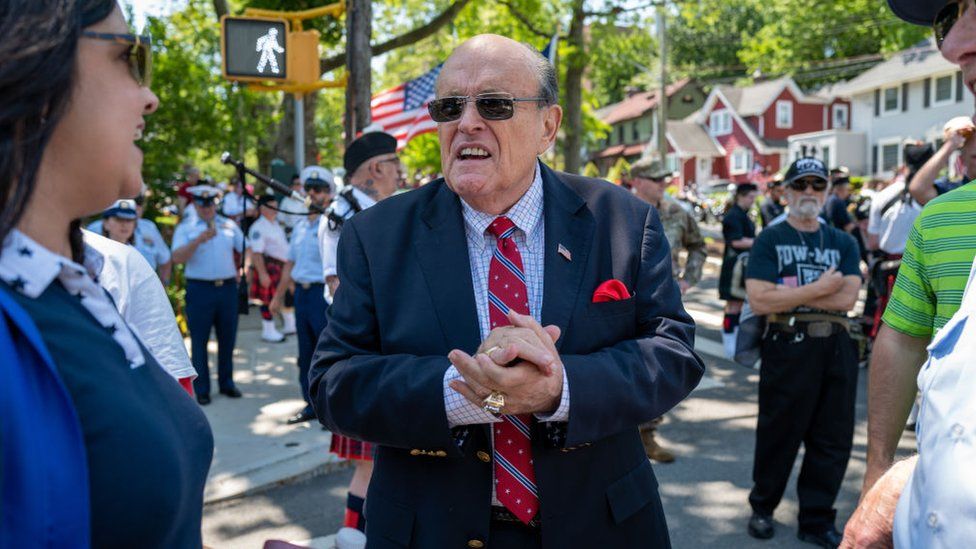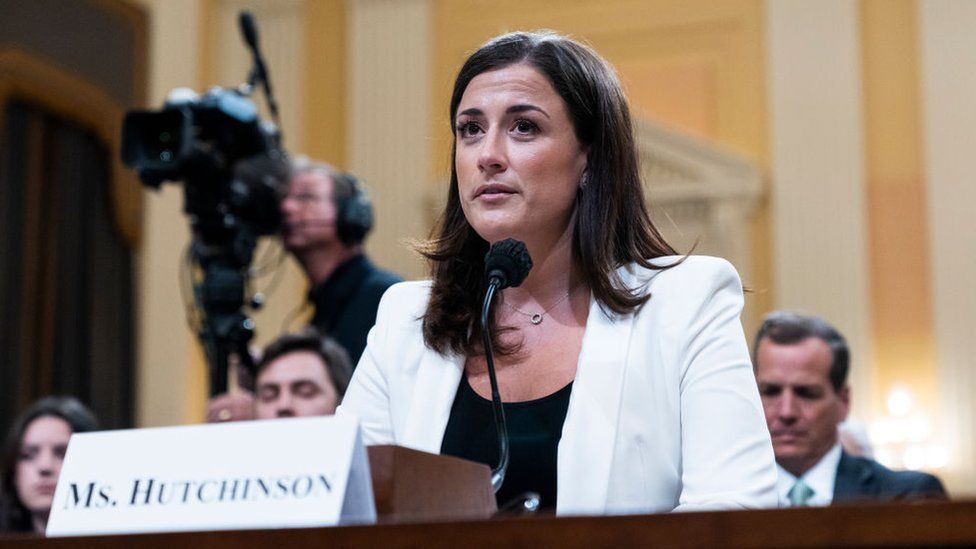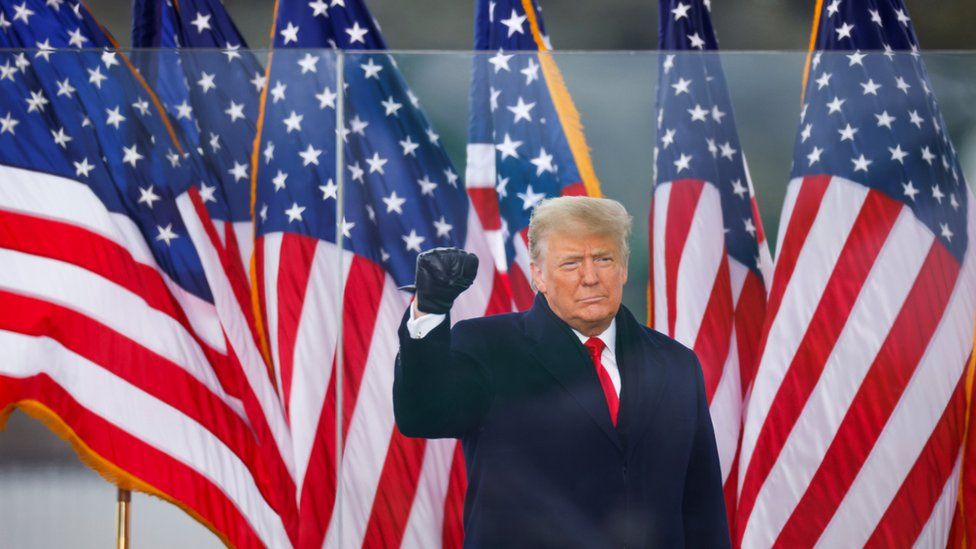The behavior of former President Donald Trump during the armed protesters’ invasion of the seat of American democracy on January 6, 2021, has come under scrutiny by the committee looking into the rioting at the US Capitol.
The congressional committee, which is composed of two Republicans and five Democrats, has been investigating the preparation and execution of the assault that shocked the whole globe.
Its members have questioned scores of witnesses in an effort to establish that Mr. Trump engaged in an unlawful campaign to reverse his loss to Joe Biden in the 2020 presidential race and to maintain power at any costs.
According to the group, there may be sufficient evidence to file criminal charges against Mr. Trump.
In eight dramatic, made-for-TV sessions, the evidence against the 76-year-old tycoon has been painstakingly presented. Here are the top eight disclosures to date.
1. Trump was frequently informed by allies that he lost
Several of Mr. Trump’s top advisors said that they advised the former president to admit defeat and inform the public that he had lost the election.
Former Attorney General Bill Barr claimed in the committee’s initial hearings in June that he advised Mr. Trump that his claims of widespread voting fraud were readily refuted.
Ivanka Trump, a key figure in the White House during Mr. Trump’s administration, admitted to the committee in a videotaped deposition that she had agreed with the prosecutor’s assessment. My perspective was impacted, she said. I acknowledged what Attorney General Barr said because I respect him.

The president was told internally that he had lost the election, according to Jason Miller, a top aide to Mr. Trump’s reelection campaign. He claimed that immediately after the votes closed, the campaign’s analytics team informed Mr. Trump “in quite straightforward words, that he was going to lose.”
2. A buzzed Trump was prodded by Rudy Giuliani to proclaim victory.
On election night, the majority of Mr. Trump’s inner circle—including his campaign manager Bill Stepien—implored him not to proclaim victory. However, it was discovered that a drunk The former New York City mayor and current advisor to Mr. Trump, Rudy Giuliani, encouraged the president to take the initiative.
Giuliani was “clearly drunk,” according to Mr. Miller, when he counseled Mr. Trump to declare victory, the committee. Giuliani reportedly urged that the president “go and proclaim victory and announce that we’d won it outright” despite the fact that the results were still being tallied.
In his testimony, Mr. Stepien discussed the creation of “Rudy’s team,” who believed the bogus allegations of election fraud spread by a number of unofficial advisers to the president, and “team normal,” who supported the election results.
Giuliani has refuted claims that he was drunk on election night.

3. Former election officials who retaliated suffered a heavy price.
Several election workers who had been singled out by Trump allies in their flimsy fraud charges testified in tears in June about the bullying they had endured after the election.
Shaye Moss, a Georgia election worker, fought back tears as she informed the audience that the Trump campaign had accused her of engaging in fraud while counting ballots, turning her life “upside down.”
I question everything I do, she admitted. “It has had a significant impact on every aspect of my life. All as a result of lying.”
And Arizona’s top election official, Rusty Bowers, said that he had come under attack from Mr. Trump’s followers for not declaring the election to be fraudulent. He said that while his critically ill daughter was inside the residence, a gang, some of whom were armed, picketed the property. A few weeks later, she passed away.
According to him, the organization labeled him “a paedophile, a pervert, and a dishonest politician.”
4. The White House was aware that the protesters were armed.
Before addressing his supporters on January 6, Mr. Trump was aware that many of them were armed, according to startling evidence from Cassidy Hutchinson, a former senior staffer to White House Chief of Staff Mark Meadows.
Ms. Hutchinson, who made an unexpected appearance as a witness during the sixth sessions, claimed that Mr. Trump knew that some of the attendees at his morning rally outside the White House were armed because they were being turned away by Secret Service agents.

“The fact that they are armed doesn’t matter to me at all. They don’t intend to harm me, “According to Ms. Hutchinson, the president stated. “Embrace my people. From here, they may march to the Capitol.”
Her testimony gave the committee the evidence they needed to prove what they had been trying to prove from the very beginning of the hearings: that Mr. Trump was aware of the very real possibility of violence yet did nothing to prevent it.
5.Trump had plans to lead the crowd to the Capitol.
Even more shocking was some of Ms. Hutchinson’s second-hand testimony. She recalled how a White House representative had informed her that the president had insisted on going to the Capitol following his rally at the White House, despite having promised to do so during his address.
She alleged that he got into a frenzy and tried to grasp the steering wheel as he struggled with a Secret Service agent after learning that his motorcade was returning to the White House for safety reasons.
Trump reportedly shouted, “I’m the [expletive] president,” according to Hutchinson. “Bring me to the Capitol right away.”
Following Ms. Hutchinson’s testimony, a Secret Service insider told CBS News that the agent and driver who were in the car with Mr. Trump were both prepared to swear under oath that the former president did not physically attack them or attempt to grasp the wheel.
6. Voting devices were ordered to be seized by justice officials
In testimony, Jeffrey Rosen said that Donald Trump gave him the order to take voting equipment after Mr. Barr left as attorney general in protest of the president’s conduct.
According to Mr. Rosen, he told the president that he lacked the legal power to issue such an order and refused him.
Sidney Powell, a lawyer and conspiracy theorist, allegedly asked Mr. Trump to grab voting machines during a meeting at the White House on December 18th, according to testimony given subsequently by former White House Counsel Pat Cipollone.

“That is a bad concept for the nation. In the United States, we don’t operate in that manner. There is no legal justification for doing it. Election contestation is a possibility, as it frequently does, “added Mr. Cipolone.
7. Trump made an effort to reach witnesses
Liz Cheney, one of the committee’s two Republicans, struck a bombshell during her closing statement on July 12 when she revealed that Mr. Trump had attempted to contact a witness who was scheduled to testify.
“President Trump attempted to call a witness in our probe after our previous hearing. A witness who hasn’t appeared before throughout these proceedings, “said Ms. Cheney. “Instead of picking up or responding to President Trump’s call, the person informed their attorney about the contact. Our attorney informed them.”
Ms. Cheney raised the likelihood of witness tampering charges by stating that the Department of Justice had been informed of the claims.
She emphasized, “Let me say it again: we will take any attempt to sway witness evidence extremely seriously.
8. Important allies requested pardons
Representatives Mo Brooks, Matt Gaetz, Andy Biggs, Louie Gohmert, and Scott Perry, among others, were among the Republican members of congress who requested pardons from Mr. Trump in the last weeks of his administration, according to testimony given before the panel on June 24.
The committee heard taped evidence from numerous former White House employees who discussed the attempts made by the Republicans to avoid punishment following the Capitol riots.
Ms. Hutchinson said that Mr. Gaetz and Mr. Brooks had supported a “blanket pardon” for participants at a meeting held in December to discuss actions scheduled for January 6.

